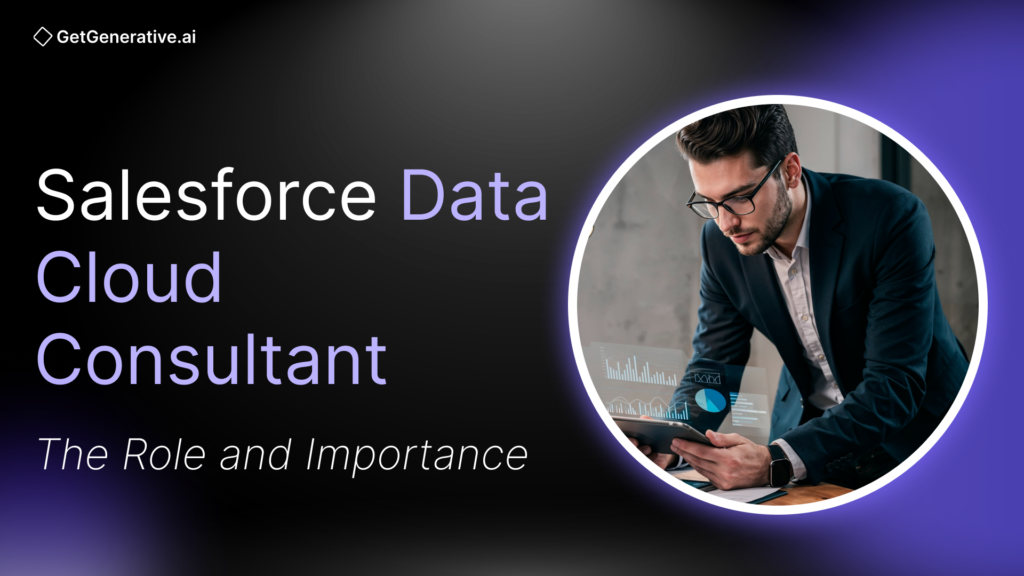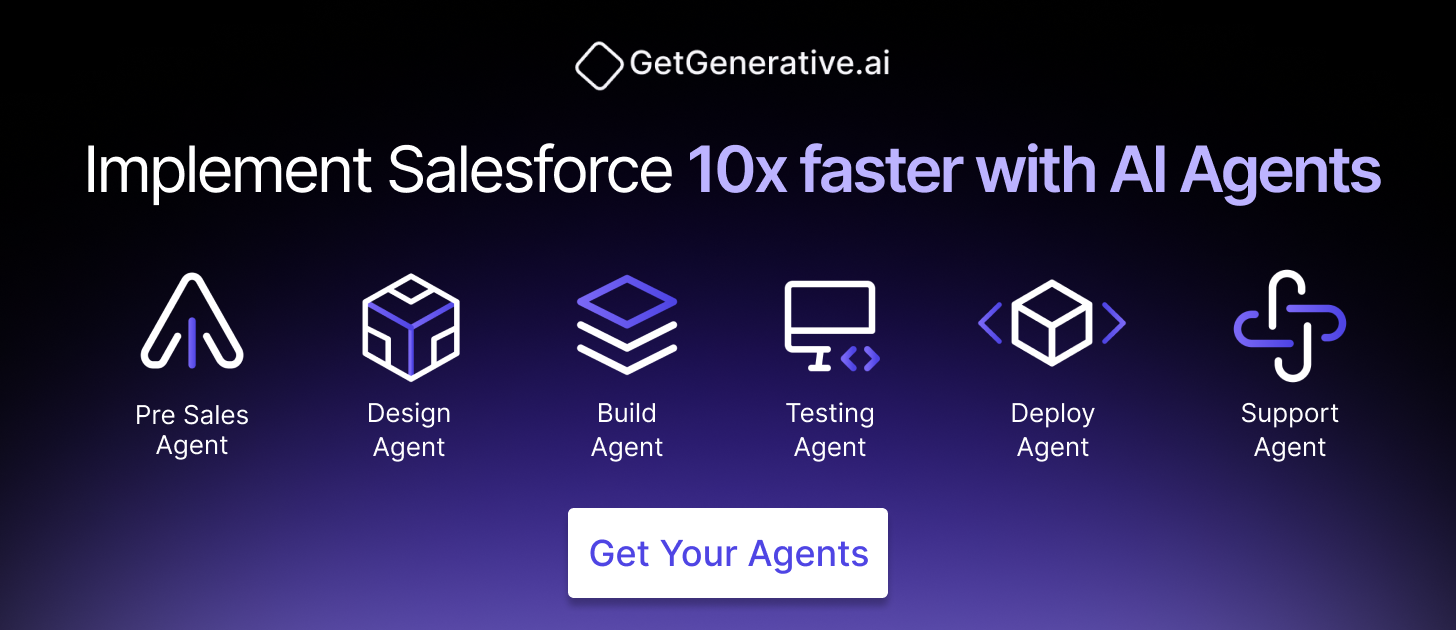Salesforce Data Cloud Consultant: The Role and Importance
The expertise of a Data Cloud Consultant has become indispensable in navigating the complexities of cloud data management. This blog delves into the role of a Data Cloud Consultant, best practices in cloud data management, the benefits of hiring one, essential cloud data management tools, the path to becoming a Data Cloud Consultant, necessary qualifications, and answers to frequently asked questions.
What Does a Data Cloud Consultant Do?
A Data Cloud Consultant is a professional who specializes in helping organizations manage their data in the cloud. Their primary responsibilities include:
- Assessment and Planning: Evaluating an organization’s current data infrastructure and determining the best cloud solutions to meet their needs.
- Migration: Assisting in seamlessly transferring data from on-premises systems to cloud platforms.
- Optimization: Ensuring the cloud data environment is optimized for performance, cost-efficiency, and scalability.
- Security: Implementing robust security measures to protect data in the cloud.
- Compliance: Ensuring that data management practices comply with relevant regulations and standards.
- Training and Support: Providing training for staff and ongoing support to ensure the smooth operation of cloud data systems.
Best Practices in Cloud Data Management
Effective cloud data management requires adherence to best practices to maximize the benefits of cloud technology:
- Data Governance: Establish clear policies and procedures for data management, including data quality standards, access controls, and compliance requirements.
- Security: Implement comprehensive security measures such as encryption, multi-factor authentication, and regular security audits.
- Scalability: Design cloud solutions that can easily scale to accommodate growing data volumes and changing business needs.
- Cost Management: Monitor and optimize cloud spending to ensure cost-effectiveness without compromising performance.
- Data Backup and Recovery: To protect against data loss, ensure regular backups and have a robust disaster recovery plan in place.
- Performance Monitoring: Continuously monitor the performance of cloud data systems to identify and address any issues promptly.
Also Read – Salesforce Data Cloud Implementation Guide
Benefits of Hiring a Data Cloud Consultant
Engaging a Data Cloud Consultant offers several advantages for organizations:
- Expertise: They bring specialized knowledge and experience in cloud data management, which can significantly enhance the effectiveness of your data strategies.
- Cost Savings: By optimizing cloud usage and implementing cost-effective solutions, they can help reduce overall cloud expenses.
- Security: Their expertise in cloud security ensures that your data is well-protected against breaches and cyber threats.
- Compliance: They ensure that your data management practices comply with relevant regulations, reducing the risk of legal issues.
- Efficiency: They streamline data management processes, leading to improved operational efficiency and faster access to data insights.
- Scalability: They design solutions that can grow with your business, ensuring that your data infrastructure remains robust and scalable.
Cloud Data Management Tools
A Data Cloud Consultant relies on various tools to manage cloud data effectively. Some of the most popular tools include:
- Amazon Web Services (AWS): Offers a comprehensive suite of cloud computing services, including storage, databases, and analytics.
- Microsoft Azure: Provides a wide range of cloud services, including virtual machines, databases, and AI.
- Google Cloud Platform (GCP): Known for its robust data analytics and machine learning capabilities.
- Snowflake: A cloud-based data warehousing solution that offers high performance, scalability, and ease of use.
- Tableau: A powerful data visualization tool that helps organizations make sense of their data through interactive dashboards.
- Databricks: A unified data analytics platform simplifying data engineering, collaborative data science, and machine learning.
How to Become a Data Cloud Consultant
Becoming a Data Cloud Consultant involves a combination of education, experience, and certification:
- Education: A bachelor’s degree in computer science, information technology, or a related field is typically required. Advanced degrees can be beneficial.
- Experience: Hands-on experience with cloud platforms and data management is crucial. This can be gained through roles such as cloud engineer, data analyst, or IT consultant.
- Certification: Certification from leading cloud providers (e.g., AWS Certified Solutions Architect, Microsoft Certified: Azure Solutions Architect Expert, Google Professional Cloud Architect) can significantly enhance your credibility.
- Continuous Learning: The cloud technology landscape is constantly evolving. Staying updated with the latest trends, tools, and best practices through continuous learning is essential.
Also Read – Salesforce Unveils Data Cloud Vector Database
What Qualifications Are Necessary for a Data Cloud Consultant?
To be successful as a Data Cloud Consultant, certain qualifications and skills are necessary:
- Technical Skills: Proficiency in cloud platforms (AWS, Azure, GCP), data management tools, and programming languages (e.g., Python, SQL).
- Analytical Skills: Ability to analyze complex data sets and derive actionable insights.
- Problem-Solving Skills: Strong problem-solving abilities to address data management challenges.
- Communication Skills: Excellent verbal and written communication skills to explain technical concepts to non-technical stakeholders.
- Project Management: Experience managing projects, including planning, execution, and monitoring.
- Business Acumen: Understanding business processes and how data management supports organizational goals.
Future Trends in Data Cloud Consulting for 2025
1. AI-Powered Cloud Data Management
AI and machine learning are transforming how data is managed in the cloud. Data Cloud Consultants are leveraging AI tools to automate data cleaning, enrichment, and anomaly detection. AI-powered insights also enable more accurate forecasting and trend analysis, giving businesses a competitive edge.
2. Edge Computing Integration
The rise of edge computing is adding complexity to cloud data ecosystems. Consultants must now design systems that integrate cloud and edge data seamlessly, ensuring real-time processing and low-latency performance for applications like IoT and AI.
3. Sustainability in Cloud Practices
Sustainability is becoming a priority for organizations. Data Cloud Consultants are adopting green cloud strategies, such as optimizing resource usage, implementing energy-efficient solutions, and leveraging renewable-powered data centers to reduce carbon footprints.
4. Data Sovereignty and Compliance
With stricter regulations around data sovereignty, consultants must navigate legal complexities to ensure that data resides in compliant regions. Tools that enable geo-restricted data storage and real-time compliance monitoring are becoming essential.
5. Multi-Cloud and Hybrid Cloud Strategies
The shift toward multi-cloud and hybrid cloud architectures requires consultants to have expertise in integrating diverse platforms like AWS, Azure, and Google Cloud. Consultants must design systems that balance flexibility, cost, and performance while mitigating vendor lock-in.
6. Real-Time Analytics and Streaming Data
Organizations are increasingly demanding real-time data processing for immediate insights. Data Cloud Consultants are focusing on integrating real-time analytics tools, such as Apache Kafka and Google Dataflow, to meet this demand and drive faster decision-making.
7. Data Privacy-First Architecture
With growing concerns about data privacy, consultants are adopting privacy-first approaches in cloud architectures. These include incorporating zero-trust security models, differential privacy techniques, and robust encryption methods to protect sensitive information.
Conclusion
A Data Cloud Consultant plays an important role in helping organizations harness the power of cloud technology for effective data management. Their expertise in assessment, migration, optimization, security, and compliance ensures businesses can leverage cloud solutions to their fullest potential. By following best practices, utilizing the right tools, and continuously updating their skills, Data Cloud Consultants can provide significant value to any organization.
Enhance your Salesforce consulting with GetGenerative.ai. Effortlessly craft outstanding proposals, enabling you to dedicate more time to providing exceptional client service.
Start today!
Frequently Asked Questions (FAQs)
1. What is a Data Cloud Consultant?
A Data Cloud Consultant is a professional who specializes in managing and optimizing data in cloud environments, including tasks such as migration, security, compliance, and performance optimization.
2. Why should I hire a Data Cloud Consultant?
Hiring a Data Cloud Consultant can bring expertise, cost savings, enhanced security, compliance, efficiency, and scalability to your cloud data management efforts.
3. What are some common tools used by Data Cloud Consultants?
Common tools include AWS, Microsoft Azure, Google Cloud Platform, Snowflake, Tableau, and Databricks.
4. What qualifications do I need to become a Data Cloud Consultant?
Necessary qualifications include a bachelor’s degree in a relevant field, hands-on experience with cloud platforms, appropriate certifications, and skills in technical, analytical, and communication areas.
5. How do Data Cloud Consultants ensure data security?
They implement measures such as encryption, multi-factor authentication, regular security audits, and compliance with relevant regulations to protect data in the cloud.
6. What are the benefits of cloud data management?
Benefits include improved data accessibility, scalability, cost-efficiency, collaboration, and disaster recovery capabilities.
7. How can I start a career as a Data Cloud Consultant?
Start with a relevant degree, gain experience in cloud data management roles, obtain certifications from major cloud providers, and continuously learn to stay updated with industry trends.




